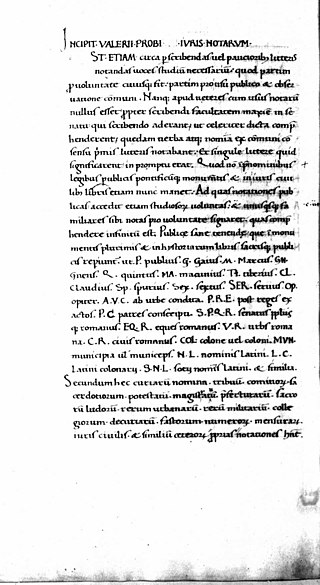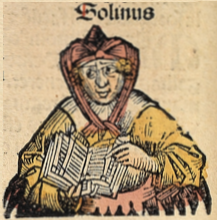Related Research Articles

Priscianus Caesariensis, commonly known as Priscian, was a Latin grammarian and the author of the Institutes of Grammar, which was the standard textbook for the study of Latin during the Middle Ages. It also provided the raw material for the field of speculative grammar.

Servius, distinguished as Servius the Grammarian, was a late fourth-century and early fifth-century grammarian. He earned a contemporary reputation as the most learned man of his generation in Italy; he authored a set of commentaries on the works of Virgil. These works, In Tria Virgilii Opera Expositio, Commentarii in Virgilium, Commentarii in Vergilii Opera, or Vergilii Carmina Commentarii, constituted the first incunable to be printed at Florence, by Bernardo Cennini, in 1471.

Nicander of Colophon, Greek poet, physician and grammarian, was born at Claros, near Colophon, where his family held the hereditary priesthood of Apollo. He flourished under Attalus III of Pergamum.
Gaius Caesius Bassus was a Roman lyric poet who lived in the reign of Nero.

Marcus Valerius Probus, also known as M. Valerius Probus Berytius or Probus the Berytian, was a Roman grammarian and critic, who flourished during Nero's reign.

Gaius Julius Solinus, better known simply as Solinus, was a Latin grammarian, geographer, and compiler who probably flourished in the early 3rd century AD. Historical scholar Theodor Mommsen dates him to the middle of the 3rd century.
Terentianus, surnamed Maurus, was a Latin grammarian and writer on prosody who flourished probably at the end of the 2nd century AD.

The gens Aemilia, originally written Aimilia, was one of the greatest patrician families at ancient Rome. The gens was of great antiquity, and claimed descent from Numa Pompilius, the second King of Rome. Its members held the highest offices of the state, from the early decades of the Republic to imperial times. The Aemilii were almost certainly one of the gentes maiores, the most important of the patrician families. Their name was associated with three major roads, an administrative region of Italy, and the Basilica Aemilia at Rome.
Quintus Asconius Pedianus was a Roman historian. There is no evidence that Asconius engaged in a public career, but he was familiar both with Roman government of his time and with the geography of the city. He may, therefore, have written much of his works in the city.
Fenestella was a Roman historian and encyclopaedic writer.
Quintus Terentius Scaurus was a Latin grammarian who flourished during the reigns of Trajan and Hadrian.

Sedulius was a Christian poet of the first half of the 5th century.
Menander Rhetor, also known as Menander of Laodicea, was a Greek rhetorician and commentator of the 3rd or 4th century AD.

Hiob or Job Ludolf, also known as Job Leutholf, was a German orientalist, born at Erfurt. Edward Ullendorff rates Ludolf as having "the most illustrious name in Ethiopic scholarship".
Gaius Marius Victorinus was a Roman grammarian, rhetorician and Neoplatonic philosopher. Victorinus was African by birth and experienced the height of his career during the reign of Constantius II. He is also known for translating two of Aristotle's books from ancient Greek into Latin: the Categories and On Interpretation. Victorinus had a religious conversion, from being a pagan to a Christian, "at an advanced old age".
Chronicon Paschale, also called Chronicum Alexandrinum, Constantinopolitanum or Fasti Siculi, is the conventional name of a 7th-century Greek Christian chronicle of the world. Its name comes from its system of chronology based on the Christian paschal cycle; its Greek author named it Epitome of the ages from Adam the first man to the 17th year of the reign of the most August Heraclius.
Blossius Aemilius Dracontius of Carthage was a Christian poet who flourished in Roman Africa during the latter part of the 5th century. He belonged to a family of landowners, and practiced as a lawyer in his native place. After the conquest of the country by the Vandals, Dracontius was at first allowed to retain possession of his estates, but was subsequently despoiled of his property and thrown into prison by the Vandal king Gaiseric, whose triumphs he had omitted to celebrate, while he had written a panegyric on a foreign and hostile ruler. He subsequently addressed an elegiac poem to the king, asking pardon, and pleading for release. The result is not known, but it is supposed that Dracontius obtained his liberty and migrated to northern Roman Italy in search of peace and quiet. This is consistent with the discovery at Bobbio of a 15th-century MS., now in the Biblioteca Nazionale at Naples, containing a number of poems by Dracontius.
Arusianus Messius, or Messus, Latin grammarian, flourished in the 4th century.
Dositheus Magister was a Greek grammarian who flourished in Rome in the 4th century AD.
Velius Longus, Latin grammarian during the reign of Trajan, author of an extant treatise on orthography. He is mentioned by Macrobius and Servius as a commentator on Virgil.
References
- Tomsin, Alfred (1952). Étude sur le commentaire virgilien d'Aemilius Asper. Bibliothèque de la Faculté de philosophie et lettres de l'Université de Liège.
- This article incorporates text from a publication now in the public domain : Chisholm, Hugh, ed. (1911). "Asper, Aemilius". Encyclopædia Britannica . Vol. 2 (11th ed.). Cambridge University Press. p. 767. That refers to Schanz, Geschichte der romischen Litteratur, sect. 598.